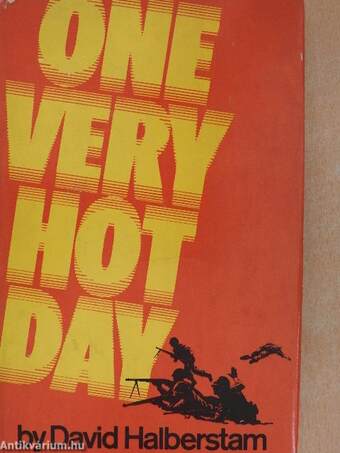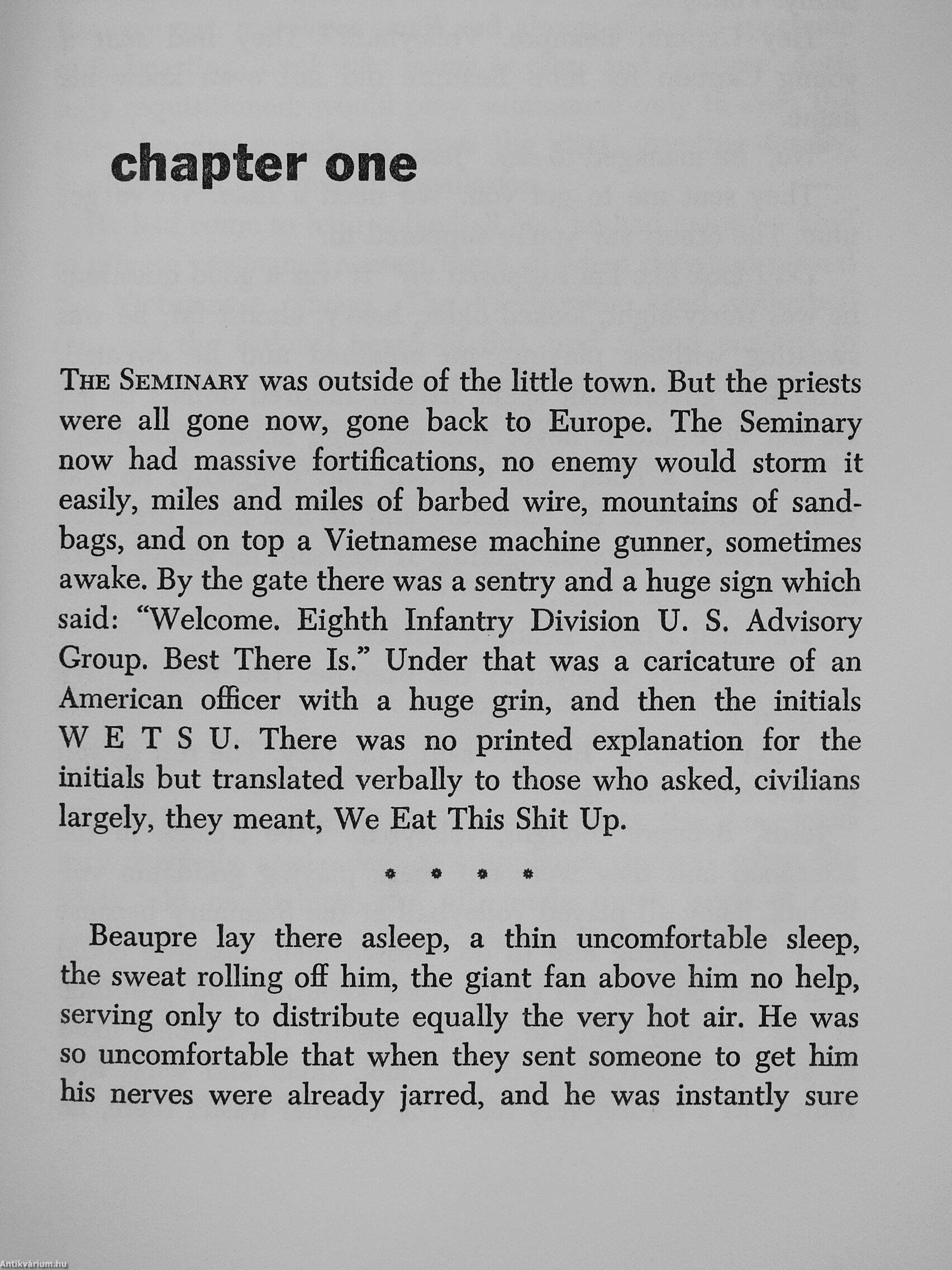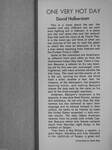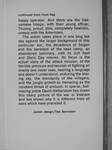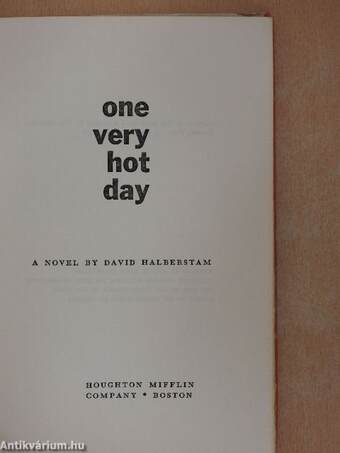1.063.444
kiadvánnyal nyújtjuk Magyarország legnagyobb antikvár könyv-kínálatát

VISSZA
A TETEJÉRE
JAVASLATOKÉszre-
vételek
One very hot day
| Kiadó: | Houghton Mifflin Company |
|---|---|
| Kiadás helye: | Boston |
| Kiadás éve: | |
| Kötés típusa: | Fűzött keménykötés |
| Oldalszám: | 216 oldal |
| Sorozatcím: | |
| Kötetszám: | |
| Nyelv: | Angol |
| Méret: | 22 cm x 14 cm |
| ISBN: | |
naponta értesítjük a beérkező friss
kiadványokról
naponta értesítjük a beérkező friss
kiadványokról
Előszó
TovábbFülszöveg
ONE VERY HOT DAY
David Halberstam
This is a novel about the war, the smaller and very different war we were once fighting out in Vietnam. It is about one day and some men and the ambush they fear past the canal at Ap Thanh Thoi. It is the novel you will think of when you see pictures of the war or read the paper or watch the news on television. It is by a man whose reporting from Vietnam won the Pulitzer Prize in 1964.
Some of the characters are Americans, as different from each other as from the Vietnamese troops they lead. There is Captain Beaupre, a veteran on his way down, too old for this new war, overweight, tired, frightened, with many enemies besides the Viet Cong. The most terrible enemy of all is the sun, burning his thirst, the thirst itself a killer; another is fear, fear, for instance, of the helicopters, the choppers meaning action, and making Beaupre choose the long walk by the canal as his part of the three-pronged operation.
Anderson, Beaupre's lieutenant,... Tovább
Fülszöveg
ONE VERY HOT DAY
David Halberstam
This is a novel about the war, the smaller and very different war we were once fighting out in Vietnam. It is about one day and some men and the ambush they fear past the canal at Ap Thanh Thoi. It is the novel you will think of when you see pictures of the war or read the paper or watch the news on television. It is by a man whose reporting from Vietnam won the Pulitzer Prize in 1964.
Some of the characters are Americans, as different from each other as from the Vietnamese troops they lead. There is Captain Beaupre, a veteran on his way down, too old for this new war, overweight, tired, frightened, with many enemies besides the Viet Cong. The most terrible enemy of all is the sun, burning his thirst, the thirst itself a killer; another is fear, fear, for instance, of the helicopters, the choppers meaning action, and making Beaupre choose the long walk by the canal as his part of the three-pronged operation.
Anderson, Beaupre's lieutenant, is his opposite. A new-style West Pointer, serious and ambitious, he not only likes the Vietnamese but has bothered to learn their language and to interest himself in their culture. He wants to be friends, to make the United States respected — with minimal results. The daily letters Anderson receives from his pretty wife irritate Captain Beaupre whose only female contacts result from Saturday night forays in the brothels of Saigon.
Then there is Big William, a captain, a giant Negro, liberating and fully liberated in the nightclubs of Saigon, a great and
continued on back flap
continued from front flap
happy operator. And there are the Vietnamese troops, with their young officer, Thuong, proud, able, completely fatalistic, uneasy with the Americans.
The action takes place in one long hot day against the larger background of this particular war, the decadence of Saigon and the boredom of the base camp, an abandoned seminary, with its dull food and Doris Day movies. Its focus is the actual story of the attack mission, of the terrible pressure and tension of fighting an enemy one never sees, hearing a language one doesn't understand, enduring the blazing sky, the mendacity of the villagers, and the jungle growth as menacing as the constant threat of ambush. In sparse, fast-moving prose David Halberstam has drawn this sharp picture of the war in Vietnam and has shown why it is different from all wars which have preceded it.
Jacket design/Ted Bernstein Vissza
Témakörök
- Idegennyelv > Idegennyelvű könyvek > Angol > Szépirodalom > Regény, novella, elbeszélés
- Szépirodalom > Regény, novella, elbeszélés > Az író származása szerint > Amerika > Amerikai Egyesült Államok
- Szépirodalom > Regény, novella, elbeszélés > Tartalom szerint > Kalandregények
- Szépirodalom > Regény, novella, elbeszélés > Tartalom szerint > Történelmi regények > Legújabb kor > Egyéb
- Szépirodalom > Regény, novella, elbeszélés > Tartalom szerint > Háborús történetek
- Szépirodalom > Regény, novella, elbeszélés > Tartalom szerint > Katonák, határőrök
- Szépirodalom > Regény, novella, elbeszélés > Tartalom szerint > Kor- és társadalomrajz
David Halberstam
David Halberstam műveinek az Antikvarium.hu-n kapható vagy előjegyezhető listáját itt tekintheti meg: David Halberstam könyvek, művekMegvásárolható példányok
Nincs megvásárolható példány
A könyv összes megrendelhető példánya elfogyott. Ha kívánja, előjegyezheti a könyvet, és amint a könyv egy újabb példánya elérhető lesz, értesítjük.



